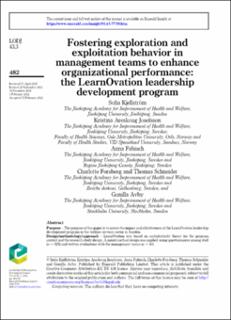| dc.contributor.author | Kjellström, Sofia | |
| dc.contributor.author | Areskoug Josefsson, Kristina | |
| dc.contributor.author | Fabisch, Anna | |
| dc.contributor.author | Forsberg, Charlotte | |
| dc.contributor.author | Schneider, Thomas | |
| dc.contributor.author | Avby, Gunilla | |
| dc.date.accessioned | 2023-02-17T13:44:10Z | |
| dc.date.available | 2023-02-17T13:44:10Z | |
| dc.date.created | 2022-04-22T09:44:52Z | |
| dc.date.issued | 2022 | |
| dc.identifier.citation | Leadership & Organization Development Journal. 2022, 43 (3), 482-500. | en_US |
| dc.identifier.issn | 0143-7739 | |
| dc.identifier.uri | https://hdl.handle.net/11250/3052014 | |
| dc.description | This article is published under the Creative Commons Attribution (CC BY 4.0) licence. Anyone may reproduce, distribute, translate and create derivative works of this article (for both commercial and non-commercial purposes), subject to full attribution to the original publication and authors. The full terms of this licence may be seen at http:// creativecommons.org/licences/by/4.0/legalcode | en_US |
| dc.description.abstract | Purpose – The purpose of this paper is to assess the impact and effectiveness of the LearnOvation leadership development program in the welfare services sector in Sweden.
Design/methodology/approach – LearnOvation was based on ambidexterity theory for the program content and the research study design. A mixed-method design was applied, using questionnaires among staff (n 5 523) and written evaluations with the management teams (n 5 60).
Findings – Quantitative analysis of the questionnaires indicated little change in managers’ and staffs’ innovation behaviors, though employee exploration behaviors were strongly and positively correlated with their innovation behaviors. Qualitative leader-written evaluations reported increased understanding of innovation management and the use of exploration and exploitation activities to involve staff in the implementation of creative ideas within the organization.
Practical implications – The authors argue that innovating is about creating a fertile ground for exploration and exploitation processes of learning that support staff’s willingness to meet goals, as well as their capability to explore new ideas and experiment in new ways of working. Leadership development activities that engage the entire management team can build the necessary capacity and power to lead innovation processes in highly structured welfare services and free the employees’ innovativeness, potentially leading to improved services and employee satisfaction.
Originality/value – With the goal of enhancing the innovation capacity in daily practice, this study adds to the scarcity of research in welfare services on how to actually support management’s work on leading successful implementation of creative ideas. | en_US |
| dc.language.iso | eng | en_US |
| dc.publisher | Emerald Group Publishing Limited | en_US |
| dc.rights | Navngivelse 4.0 Internasjonal | * |
| dc.rights.uri | http://creativecommons.org/licenses/by/4.0/deed.no | * |
| dc.subject | welfare services | en_US |
| dc.subject | exploration and exploitation behavior | en_US |
| dc.subject | ambidexterity | en_US |
| dc.subject | innovation | en_US |
| dc.subject | leadership development | en_US |
| dc.title | Fostering exploration and exploitation behavior in management teams to enhance organizational performance: the LearnOvation leadership development program | en_US |
| dc.type | Peer reviewed | en_US |
| dc.type | Journal article | en_US |
| dc.description.version | publishedVersion | en_US |
| dc.rights.holder | © Sofia Kjellstr€om, Kristina Areskoug Josefsson, Anna Fabisch, Charlotte Forsberg, Thomas Schneider and Gunilla Avby. Published by Emerald Publishing Limited | en_US |
| dc.source.pagenumber | 482-500 | en_US |
| dc.source.volume | 43 | en_US |
| dc.source.journal | Leadership & Organization Development Journal | en_US |
| dc.source.issue | 3 | en_US |
| dc.identifier.doi | 10.1108/LODJ-04-2021-0162 | |
| dc.identifier.cristin | 2018310 | |
| cristin.ispublished | true | |
| cristin.fulltext | original | |
| cristin.qualitycode | 1 | |

